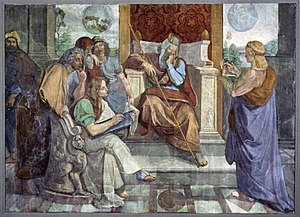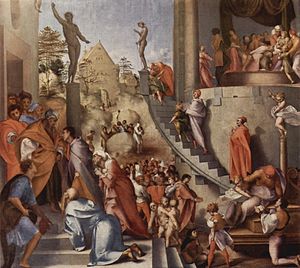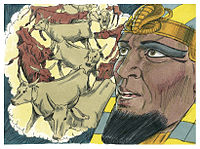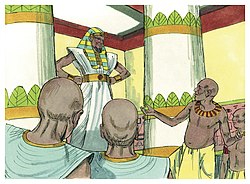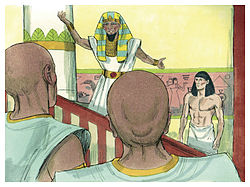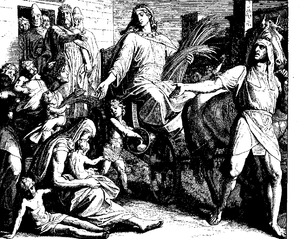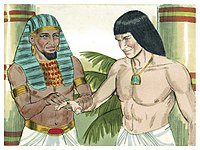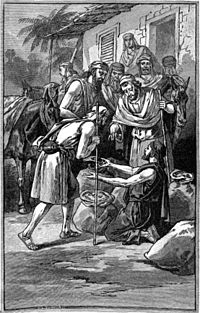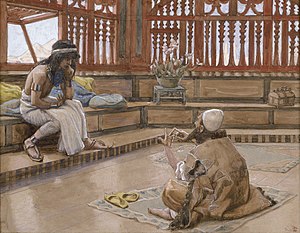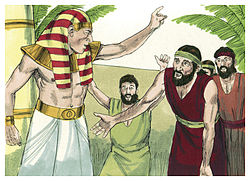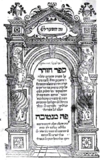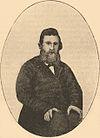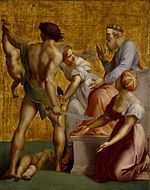Miketz
)[1] Jews read Parashat Miketz on the tenth Sabbath after Simchat Torah, generally in December, or rarely in late November or early January, usually during Chanukah.
[7] Then the chief butler spoke up, confessing his faults and relating how Pharaoh had put him in prison with the baker, and a Hebrew there had interpreted their dreams, correctly predicting the future.
[18] Pharaoh gave Joseph his signet ring, fine linen, a gold chain about his neck, and his 2nd chariot, and had people cry "Abrech" before him.
[23] In the fourth reading, the seven years of plenty ended and famine struck, and when Egypt was famished, Joseph opened the storehouses and sold food to the Egyptians.
[51] In the sixth reading, when Joseph saw Benjamin with them, he directed his steward to bring the men into the house and prepare a meal for him to eat with them at noon.
[61] In the seventh reading, Joseph left hastily for his chamber and wept, washed his face, returned, and called for the servants to serve the meal.
[79] Von Rad likened Joseph's actions (for example in Genesis 41:14–33) to the admonition of Ptahhotep (an Egyptian vizier during the late 25th and early 24th centuries BCE): "If you are a tried counselor who sits in the hall of his lord, gather your wits together right well.
"[80] The parashah has parallels or is discussed in these Biblical sources:[81] Von Rad saw affinity between Joseph's actions (for example in Genesis 41:14) and Proverbs 22:29, "See a man diligent in his business?
"[83] The parashah has parallels or is discussed in these early nonrabbinic sources:[84] Philo observed that having attained authority and presented with the opportunity for revenge for the ill-treatment that he had received, Joseph nonetheless bore what happened with self-restraint and governed himself.
The Midrash taught that the purpose of all this sending for and failing of magicians was so that Joseph might come at the end and be raised to high rank.
"[91] Reading Genesis 41:14, "And Joseph shaved himself and changed his clothes," a Midrash taught that cutting his hair improved his appearance and made him look handsome.
[103] The Pirke De-Rabbi Eliezer taught that when Joseph rode in his chariot (as described in Genesis 41:43), the Egyptian girls climbed up the walls to see him and threw him rings of gold so that he might look at them and they could see the beauty of his figure.
[107] Similarly, reading Genesis 41:50, "And to Joseph were born two sons," Rabbi Muna and Rav Huna taught that this occurred before the famine came.
The Midrash taught that God rewarded Joseph for resisting Potiphar's wife by making him ruler (הַשַּׁלִּיט, hashalit) over the land of Egypt (as reported in Genesis 42:6).
Calling them fools, Pharaoh recalled that during the years of plenty, a herald had continually proclaimed that a famine was coming, and asked why they had not saved grain in reserve.
The Midrash interpreted Genesis 42:1 to mean that Jacob told his sons that they were all strong and brotherly; they were not to enter through one gate and all stand in the same place, so that they should not tempt the evil eye.
[123] Rav Huna deduced from Judah's commitment to Jacob with regard to Benjamin in Genesis 43:9, "I will be surety for him; of my hand shall you require him," that a guarantor becomes responsible for the debt that he has guaranteed.
To support the proposition that assuming airs of authority shortens one's life, the Gemara cited the teaching of Rabbi Ḥama bar Ḥanina that Joseph died (as Genesis 50:26 reports, aged 110) before his brothers because he assumed airs of authority (when in Genesis 43:28 and 44:24–32 he repeatedly allowed his brothers to describe his father Jacob as "your servant").
[128] Rabbi Samuel ben Naḥman taught that when Joseph saw Benjamin, his mind was immediately set at rest and he exclaimed in the words of Genesis 43:29, "God be gracious to you, my son," and ordered that they bring him near.
Rabbi Jose ben Ḥanina taught that the brothers also abstained from wine after they departed from him, for Genesis 43:34 reports, "And they drank, and were merry with him," implying that they broke their abstention "with him."
[133] Rav Naḥman bar Isaac quoted Judah's words, "What shall we speak or how shall we clear ourselves" (נִּצְטַדָּק, niztadak), in Genesis 44:16 as an example of where the Torah used an abbreviation.
Rav Naḥman bar Isaac read the word נִּצְטַדָּק, NiZTaDaK, "can we show innocence," as an acronym for: We are honest (נכונים, Nekonim), we are righteous (צַדִּיקִים, Zaddikim), we are pure (טְהוֹרִים, Tehorim), we are submissive (דָּכְיָם, Dakkim), we are holy (קְדוֹשִׁים, Kedoshim).
[141] Naḥmanides, however, disagreed, arguing that Joseph took control of all the food in Egypt and distributed quantities to the Egyptian people each year in accordance with their needs for sustenance.
[147] And David Kimhi (RaDaK) interpreted the steward to mean that if the brothers found the money in their sacks, it was a gift from heaven, comparable to if a human being had given them a treasure.
[149] Ephraim Speiser argued that in spite of its surface unity, the Joseph story, on closer scrutiny, yields two parallel strands similar in general outline, yet markedly different in detail.
[151] Kselman reported that recent scholarship points to authorship of the Joseph narrative in the Solomonic era, citing Solomon's marriage to Pharaoh's daughter (reported in 1 Kings 9:16) as indicative of that era as one of amicable political and commercial relations between Egypt and Israel, thus explaining the positive attitude of the Joseph narrative to Egypt, Pharaoh, and Egyptians.
[154] Donald Redford and other scholars following him suspected that behind the Joseph story stood an altogether invented Egyptian or Canaanite tale that was popular on its own before an editor changed the main characters to Jacob and his sons.
[157] The wisdom ideology maintained that a Divine plan underlay all of reality, so that everything unfolds in accordance with a preestablished pattern—precisely what Joseph says to his brothers in Genesis 44:5 and 50:20.
[167] Robert Alter wrote that the steward dismissed the brothers' fears by introducing a kind of fairy tale explanation for the silver that they found in their bags.
Speiser thought that the Jahwist's interest reached much deeper to Joseph's gnawing doubts over whether his brothers had morally regenerated in the intervening years.

